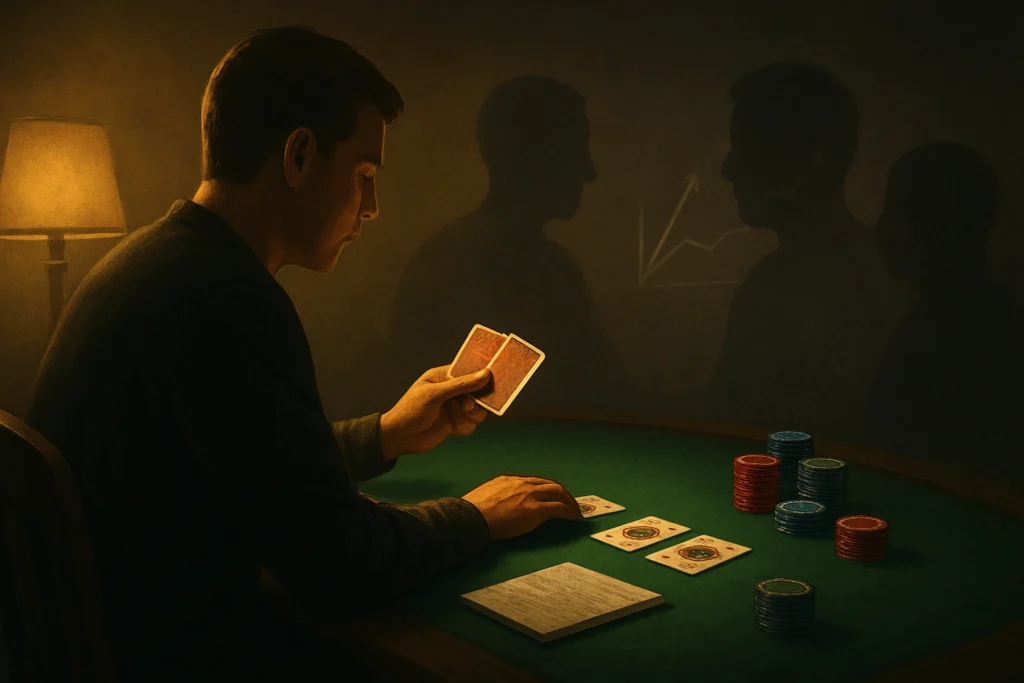
Poker, renowned for its intricate blend of strategy, psychology, and interpersonal dynamics, also encompasses a lesser-explored aspect, solitary play. This mode of playing poker, whether against digital opponents or in simulated environments, shifts the focus from a communal to a personal mastery of the game. This comprehensive examination delves into how solitary poker practice can significantly shape and refine a player’s skills, specifically enhancing mathematical understanding, strategic flexibility, psychological resilience, and more.
Table of Contents
ToggleUnderstanding the Nature of Solitary Poker Play
Solitary poker play is fundamentally different from its traditional counterpart. In this practice mode, a player engages with poker software or digital platforms to analyze hands, test strategies, or play against AI opponents. This form of play emphasizes personal skill development over the social aspects of poker. It allows for an uninterrupted focus on game theory, probabilistic analysis, and strategic planning without the external pressures of a typical poker table. By removing the psychological gameplay that comes with real-life opponents, players can focus exclusively on improving their technical skills, which includes everything from calculating hand odds to managing virtual bankrolls effectively.
Also read: Reading Poker Tells Online, Learn how to spot subtle behavioral clues even in virtual environments.
Enhanced Focus on Mathematical Strategies
Deep Dive into Odds and Probabilities
Solitary poker play strips away the external distractions of traditional gameplay, allowing players to delve deeply into the mathematical core of poker. This involves a meticulous analysis of hand probabilities, pot odds, expected value calculations, and risk management strategies. By regularly engaging in this focused mathematical practice, players develop an intuitive grasp of the numbers, enhancing their ability to make quick, accurate decisions during live play. This rigorous mathematical training becomes second nature, providing a solid foundation that supports all other aspects of poker strategy.
Strategic Use of Mathematical Insights
In isolation, players can methodically test theoretical strategies and apply complex mathematical concepts to their game without the fear of immediate financial loss. This scenario provides an ideal laboratory for exploring advanced poker theories, such as game theory optimal (GTO) play, and applying them in varying contexts to see how they affect the outcomes of hands. Over time, this practice not only reinforces a player’s understanding of poker mathematics but also integrates these concepts into their overall strategic approach, making them more adaptable and formidable players in competitive settings.
Don’t miss: Top 5 Online Poker Mistakes – Avoid common errors that hinder your solo practice or live gameplay.
Strategic Experimentation and Flexibility
Exploring New Tactical Approaches
The solitude of playing poker alone offers a unique opportunity for strategic experimentation. Players can explore a wide range of strategies, from hyper-aggressive maneuvers to ultra-conservative plays, to determine their effectiveness across different scenarios. This kind of risk-free experimentation allows players to step outside their comfort zones, try new tactics, and understand the nuances of various play styles without the stakes of real-world repercussions. This process not only fosters a creative strategic mind but also builds a comprehensive playbook that players can draw from in competitive situations.
Adaptation and Response to Game Scenarios
Solitary play enables players to simulate specific, often complex, poker scenarios that might not frequently occur in live games. This can include practicing how to handle large chip leads, navigating short-stack situations, or refining endgame strategies for tournament play. By repeatedly facing these scenarios in a controlled environment, players can develop nuanced strategies and automatic responses, ensuring they are well-prepared for any situation they might encounter in actual tournament play.
Psychological and Emotional Development
Building Mental Endurance and Focus
Extended sessions of solitary poker can be mentally taxing, requiring sustained concentration and strategic thinking. This form of play trains players to maintain high levels of focus over long periods, akin to the demands of serious poker tournaments. It also helps in cultivating a patient, disciplined approach to the game, as players learn to manage their emotional responses to winning and losing streaks in isolation. This development of mental stamina is crucial for enduring the often grueling hours of professional poker play.
Coping with Variance and Setbacks
Poker variance, fluctuations in a player’s bankroll due to the game’s inherent randomness, is particularly pronounced in solitary play, where the emotional support of peers is absent. Learning to handle these ups and downs alone helps players develop psychological resilience and a balanced perspective on the outcomes of their actions. This mental toughness and emotional stability are vital for navigating the volatile landscapes of competitive poker.
Cultivating Personal Discipline and Self-Reliance
Enhanced Decision-Making Autonomy
Playing poker in isolation forces players to rely solely on their judgment and decision-making skills, fostering a deep sense of self-reliance. This independence is crucial in live poker, where decisions must often be made under pressure and without external input. The confidence gained from making strategic decisions in solitude translates directly to enhanced self-assurance at the poker table, empowering players to trust their instincts and make bold moves when necessary.
Routine Development and Consistency
Regular, disciplined practice in a solitary environment helps in establishing a routine that emphasizes consistent study and play. This routine is essential for maintaining and advancing skill levels, ensuring that players remain engaged with the evolving dynamics of poker and continuously refine their strategies. This disciplined approach not only enhances a player’s performance but also instills habits that are beneficial for professional growth in any field.
Solitary poker play, while distinct from the communal thrill of live games, offers profound opportunities for personal development. It allows players to deeply engage with the mathematical and strategic aspects of poker, build psychological resilience, and cultivate a disciplined approach to gameplay. These skills, honed in the quiet of solitary practice, are invaluable in the competitive poker arena, where they complement and enhance the interpersonal skills and live gameplay strategies that mark a well-rounded poker player.
Whether you’re a casual player or sharpening your strategy for the big leagues, Bluffing Monkeys is your go-to resource for advanced insights into poker theory and performance enhancement.
